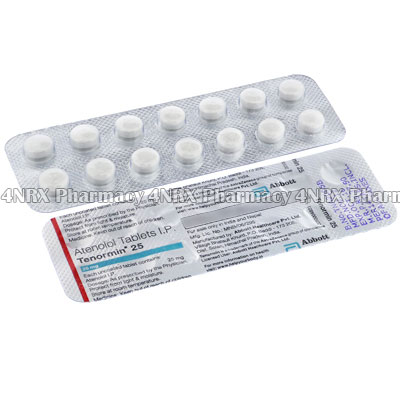 |
Home  Heart Heart  Tenormin (Atenolol) Tenormin (Atenolol) |
|
|||||||||
|
|
Tenormin (Atenolol)
What is Tenormin (Atenolol) used for? Tenormin (Atenolol) is an oral beta-blocker prescribed to treat patients suffering from hypertension or angina. The medication reduces the amount of work required by the heart to circulate the blood. This can reduce or prevent symptoms such as faintness, headaches, chest pain, or painful breathing. Your doctor may prescribe it to be used along with other medications or for the treatment of other unlisted conditions. How should I use Tenormin (Atenolol)? Tenormin (Atenolol) should always be used according to your doctor`s instructions to ensure the safest and most effective results. The normal dosage one tablet administered once or twice each day depending on the patient`s age, weight, current health, the condition being treated, and the severity of his or her symptoms. These should be swallowed with a large glass of water and may be taken with or without food, although a snack or meal is recommended before use if you get an upset stomach. Never crush, split, or chew the tablets prior to use as this may destroy or alter the effects of their contents. Ask your doctor any questions you have about using the medication to ensure the correct administration. What are the side effects of Tenormin (Atenolol)? Tenormin (Atenolol) may cause side effects in some patients including:
Serious side effects that may require emergency medical attention are faintness, irregular heartbeats, chest pain, trouble breathing, swelling of the extremities, depression, cold feeling in the hands or feet, darkened urine, discoloured stools, or jaundice. Inform your doctor as soon as you experience any intense or worrying symptoms to make sure the necessary adjustments are made to your application frequency or dosage to stop further health problems from occurring. Please Note Tenormin (Atenolol) should not be used by patients who are children or who have hypotension, bradycardia, uncontrolled heart failure, cardiogenic shock, 2nd or 3rd degree heart block, peripheral arterial disorder, metabolic acidosis, or an untreated tumour of the adrenal gland. Also inform your doctor if you have psoriasis, diabetes, an overactive thyroid gland, myasthenia gravis, history of asthma, chronic obstructive pulmonary disease, heart failure, 1st degree heart block, decreased kidney function, or decreased liver function. These conditions may cause unexpected health problems requiring special alterations to your regimen. Strictly use Tenormin (Atenolol) as prescribed and follow all instructions provided by your doctor. Safe, suitable, and optimum dosage can vary and is dependent on the patient`s health and medical history, as well as the condition you are treating. Tenormin may not be safe or suitable for all patients. Always ensure your doctor is informed if you are pregnant or breastfeeding, using any other type of medication (including non-prescription medicine, vitamins, and supplements), as well as if you have any allergies, other illnesses, or pre-existing medication conditions. Seek immediate medical attention or proceed to your nearest accident and emergency department if you suffer a hypersensitive or allergic reaction. Symptoms usually present during a reaction of this nature include difficulty breathing or swallowing, swelling of the limbs or face, tight chest, hives, and skin rashes. 
|
||||||||||||||||||